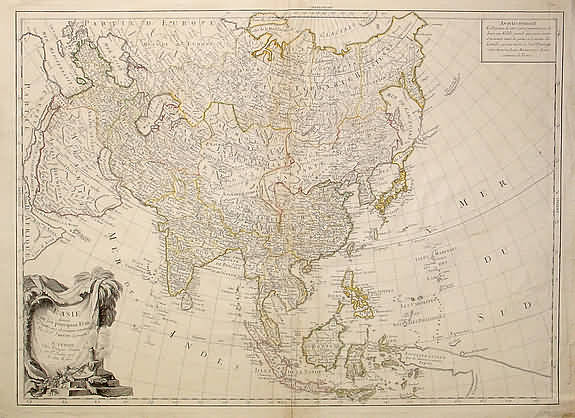Welcome to the first Asian History Carnival! The deadline for submissions was 10/10, which just happened, this year, to fall on the holiday of Columbus Day (observed in Hawai’i as “Discover’s Day“). Columbus, as we all know, never made it to Asia, in no small part because he was relying on the geographically unsound writings of Marco Polo. In honor of this conjunction, I’ve composed a haiku, and because this is a blog carnival, there are links:
Marco Polo wrote
a bad book about China;
Columbus read it.
In honor of the tradition of Marco Polo, we will take our virtual journey from West to East. And we won’t be terribly picky about geography. Since this is the first AHC, I’m also going to take considerable liberties to introduce certain particularly good Asian history bloggers (who might host future editions?).
Middle East
Our first stop is a 3rd century Syrian …. what? (it’s a quiz, I don’t want to ruin the surprise)
Central Asia
The honor of the first submission to the first AHC went to J. Otto Pohl, proprietor of the Carnival of Diasporas, with his History of Cotton in Uzbekistan.
Subcontinent
Sepoy is one of my favorite bloggers, so it’s hard for me to pick from his œuvre. There’s the posts on drugs and games, Madrasas and Pehlwani, rebel warriors and, my personal favorites, on language. His facility for erudite procrastination makes him one of my favorite writers.
Southeast
http://www.2bangkok.com/ is running a series of historic photos of Bangkok, like this collection of 1920s images from a Japanese documentary.
China
Alan Baumler has a great facility with images and with complicated historical and cultural issues.
Natalie Bennett did a very nice review of the Chinese women’s language Nushu, much easier reading than most of the academic treatments I’ve fallen asleep over.
Andrew Meyer, who has one of the coolest blog names I know, attempted meta-history, which got a little conversation going. He didn’t go quite as deep as to deny the existence of China, but it was still interesting.
The Angry Chinese Blogger seems to focus on controversies, like the lawsuit regarding the hundred-head race, textbooks and the degradation of the Great Wall in the face of development.
Korea
Owen Miller writes quite a bit on Korean history: for his “best foot forward” he offered to share his old book collection, in this case mid-20c Korean materials with fascinating histories. Miller also recommended Antti Leppanen’s Finnish language (but with lots of English links) Korean History course blog.
Konrad Lawson did some very nice work in Korean history a while back (and more to come, I’m sure): among my favorites were his discussions of the language and reality of slavery and an old geography text.
Japan
Todd Crowell, whose blogging is really just an offshoot of his fine reportage, notes the end of almost four decades of Narita protests.
Imperialism is a running theme in blogging about Japanese history, for obvious reasons. Jane Pickard used Kenkoku Kinen no Hi to talk about imperialism and anti-emperor sentiment in her family. Joi Ito used his impressively deep family history to talk about Japan’s new National ID system. Mutant Frog (no, they’re not a heretical offshoot of our group, really!) noticed that the Kodansha publishing house had an imperialistic background. And in the cultural imperalism category, KokuRyu noted both some successes and some problems in Japanese archaeology.
Without question the most controversial post on Frog in a Well so far has been Tak’s Jared Diamond piece. Konrad Lawson’s been plumbing the depths of historical memory, in the form of nostalgia and movies.
Finally, some of my own meanderings. A question about 1590s warfare led to Stephen Turnbull’s history of the Japanese invasions of Korea, which led me to read Turnbull’s Ninja.
Endnotes
Special thanks to Konrad Lawson, Natalie Bennett, J. Otto Pohl, Manan Ahmed and Owen Miller. All errors of fact, spelling, interpretation or tone are entirely my fault. Probably.
Wanna waste some time? Simon World’s Asian Blogroll is your one-stop shop.
The position of host is open! If you’re an Asian history blogger, you can volunteer to host the 12/12 edition! Or, just write some good history between now and then, and share it with all of us. Contact me.
![]()






